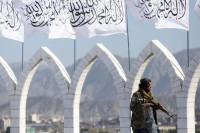World
Uncertain future awaits Afghan nationals repatriated by Pakistan
Those arriving in Afghanistan complained of hardships they had to face to move out of Pakistan and uncertainty over their future.
Reuters
Pakistan opened more border centres on Friday to expedite the return of tens of thousands of undocumented Afghan nationals, an official said, ignoring calls by refugee groups to reconsider its mass expulsion plans.
Facilities at the northwestern border crossing of Torkham, where most immigrants are re-entering Afghanistan, have been increased three times to cater to the rising number of returnees, said Abdul Nasir Khan, deputy commissioner for the Khyber district.
“Everything is normal now as the returnees no longer needed to wait in queues for hours,” he told Reuters of the crossing, where thousands had thronged after a Wednesday deadline expired for Afghans in the country illegally to leave.
Those arriving in Afghanistan complained of hardships they had to face to move out of Pakistan and uncertainty over their future.
“We spent three days on border in Pakistan. We had very bad situation,” said Mohammad Ismael Rafi, 55, who said he lived for 22 years in the southwestern Pakistani border town of Chaman where he had a retail business.
“Thank God that we have arrived back to our country,” he said. It took him six days to leave his home in Pakistan with his 16 family members and belongings to reach a makeshift tent village on the other side of the border.
Rafi accused Pakistani officials of taking bribes to process his repatriation. Authorities deny that.
He has rented a house in Kandahar to live temporarily before moving to his ancestral home in Helmand province.
Sudden influx
Pakistan has brushed off calls from the United Nations, rights groups and Western embassies to reconsider its plan to expel more than 1 million of the 4 million Afghans in the country, saying they had been involved in Islamist militant attacks and crimes that undermined the security of the country.
Kabul denies the accusations, saying Pakistani security is a domestic problem and calling on Islamabad to reconsider.
The Taliban-run administration in Afghanistan, scrambling to cope with the sudden influx, has set up temporary transit camps where food and medical assistance would be provided.
In a joint statement, the Norwegian Refugee Council, Danish Refugee Council and International Rescue Committee have reported chaotic and desperate scenes among those arriving.
Pakistani authorities started rounding up foreigners, most of them Afghans, hours before the deadline. Undocumented people who do not leave face arrest and forcible expulsion as a result of a government ultimatum delivered a month ago.
Many of the migrants fled Afghanistan during the decades of armed conflict since the late 1970s, while the Islamist Taliban’s takeover after the withdrawal of U.S.-led coalition forces in 2021 led to another exodus.
Khan said 19,744 Afghans had crossed the border on Thursday, of 147,949 since the government announced the deadline. More than 35,000 undocumented Afghans have left through another southwestern Pakistani border crossing at Chaman.
Pakistani authorities have said they were open to delaying repatriation for people with health or other issues that would bar them from travelling.
“A seven-month pregnant woman came in and was asking to leave with her family,” said Deputy Commissioner Junaid Iqbal in southern port city of Karachi, which is thought to have the largest population of undocumented Afghans.
Like other places, Pakistan’s largest city has set up holding centres where immigrants are housed before travelling to one of the two main borders areas, where a female doctor examines migrant woman.
“We told her to go back home and have her baby here in Pakistan and to go back with her family later for the sake of the mother and child’s well-being,” Iqbal said.
Islamabad has eased a biometric requirement for Afghan women and children to save them the hours-long process at the borders.




 8.83°C Kathmandu
8.83°C Kathmandu














